The automotive software market is projected to grow from USD 20.1 billion in 2025 to USD 56.5 billion by 2035, registering a CAGR of 10.9%. Analyzing the growth rate volatility across the decade indicates a relatively stable expansion with minor fluctuations, reflecting steady adoption of software solutions in vehicle electrification, autonomous driving, and connected mobility. Between 2025 and 2030, the market rises from USD 20.1 billion to USD 33.7 billion, with annual growth rates ranging between 8.8% and 11.2%.
This period experiences moderate volatility due to varying rates of integration of advanced driver-assistance systems (ADAS), infotainment platforms, and cybersecurity solutions across regions and OEMs. From 2030 to 2035, the market further expands from USD 33.7 billion to USD 56.5 billion, with annual growth consistently around 10–12%, reflecting a maturing market where technology adoption becomes more uniform and global standards drive predictable demand.
Geographically, Asia-Pacific leads in volume adoption due to increasing EV production and connected car initiatives, while Europe and North America contribute significantly to high-value software revenue through premium vehicles and autonomous systems. The volatility index remains moderate, suggesting that while individual regions or technology segments may experience short-term fluctuations, the overarching market trajectory maintains a smooth, upward growth curve.
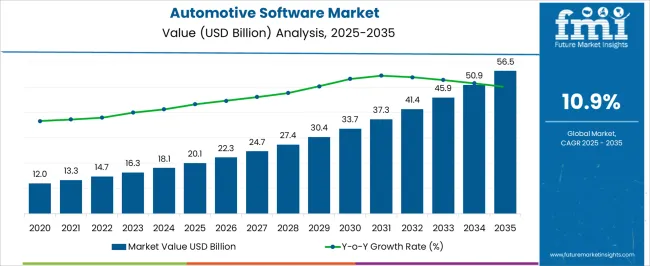
| Metric | Value |
|---|---|
| Automotive Software Market Estimated Value in (2025 E) | USD 20.1 billion |
| Automotive Software Market Forecast Value in (2035 F) | USD 56.5 billion |
| Forecast CAGR (2025 to 2035) | 10.9% |
The automotive software market is primarily driven by the automotive electronics market, which accounts for approximately 35–40% of total demand, as software is increasingly integrated into ECUs, infotainment systems, and vehicle control modules to enhance performance, connectivity, and user experience. The connected and autonomous vehicle market contributes around 25–27%, reflecting the deployment of software for telematics, V2X communication, and autonomous driving capabilities. The electric vehicle (EV) market holds roughly 15–18%, driven by the need for battery management systems, energy optimization, and drive control software. The vehicle safety and ADAS market contributes approximately 12–14%, reflecting software applications in collision avoidance, lane assist, adaptive cruise control, and parking assistance.
The automotive telematics and fleet management market accounts for 5–6%, supported by software for tracking, predictive maintenance, and fleet optimization. Collectively, these parent markets define the technological, operational, and integration ecosystem of the automotive software market, enabling automakers and suppliers to enhance vehicle safety, connectivity, efficiency, and digital user experience across conventional, hybrid, and electric vehicles worldwide.
The automotive software market is experiencing significant momentum, driven by the increasing integration of digital technologies, connectivity features, and intelligent vehicle control systems across global automotive production. Current market dynamics are shaped by growing demand for advanced driver-assistance systems, infotainment solutions, and predictive maintenance capabilities, supported by continuous investments in embedded systems and cloud-based automotive platforms.
Regulatory frameworks promoting safety, emissions control, and cybersecurity compliance are further accelerating the adoption of sophisticated software architectures. Automakers and Tier 1 suppliers are enhancing partnerships with technology providers to develop scalable, upgradeable solutions that meet evolving consumer expectations.
While cost pressures and integration complexities remain challenges, advancements in over-the-air (OTA) updates and standardized development frameworks are reducing deployment timelines. Over the forecast period, the market is expected to witness steady growth, supported by electrification trends, autonomous driving development, and the rising importance of software-defined vehicle platforms, ensuring that software remains a critical value driver within the automotive ecosystem.
The automotive software market is segmented by offering, vehicle, propulsion, application, end use, and geographic regions. By offering, the automotive software market is divided into Application software, Operating systems, and Middleware. In terms of vehicles, the automotive software market is classified into Passenger cars, hatchbacks, sedans, SUVs, Commercial vehicles, Light Commercial Vehicles (LCVs), and Heavy Commercial Vehicles (HCVs). Based on propulsion, automotive software market is segmented into ICE and Electric vehicle.
By application, automotive software market is segmented into Safety systems, Infotainment & telematics, Powertrain & chassis, Body control & comfort, and Others. By end use, automotive software market is segmented into OEM and Aftermarket. Regionally, the automotive software industry is classified into North America, Latin America, Western Europe, Eastern Europe, Balkan & Baltic Countries, Russia & Belarus, Central Asia, East Asia, South Asia & Pacific, and the Middle East & Africa.
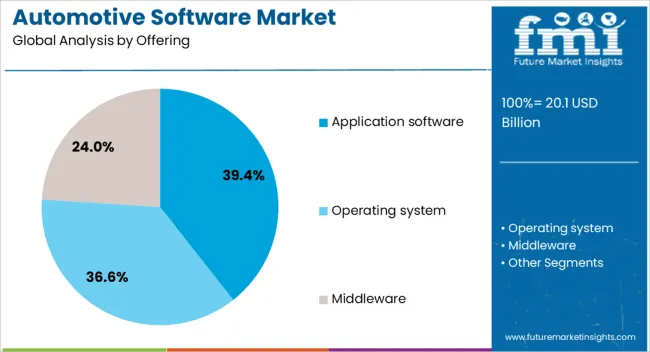
The application software segment, holding 39.40% of the offering category, leads the market due to its central role in delivering vehicle functionality, user experience, and operational efficiency. This segment encompasses a wide range of solutions, from infotainment and navigation to safety-critical control systems, all of which are essential for modern vehicle performance.
Growth has been supported by increasing demand for customization, integration with mobile devices, and connectivity services that enhance the driving experience. Continuous innovation in software development tools and frameworks has enabled faster deployment cycles, while OTA updates have allowed for ongoing performance optimization without hardware changes.
OEMs are leveraging application software to differentiate their offerings and align with regulatory mandates, particularly in safety and environmental compliance. The segment’s strong position is expected to be reinforced as software-defined vehicle concepts mature, making application software a key competitive differentiator in the automotive industry.
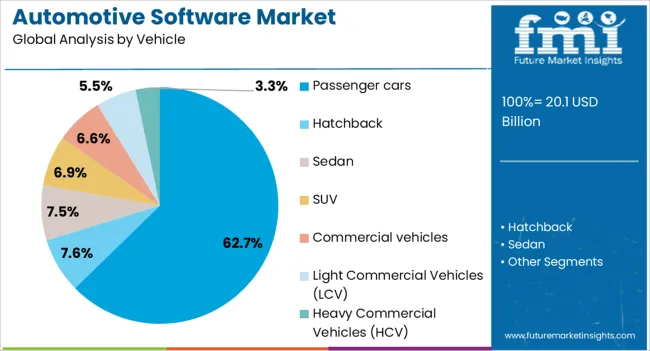
The passenger cars segment, accounting for 62.70% of the vehicle category, dominates due to the high production volumes and increasing digital content integration in this segment. Rising consumer expectations for connected services, advanced infotainment, and enhanced safety features have driven automakers to incorporate more sophisticated software into passenger vehicles.
Regulatory requirements for safety systems such as lane-keeping assistance, adaptive cruise control, and collision avoidance technologies further amplify this trend. Higher adoption rates of electric and hybrid variants within passenger cars are also boosting software demand, particularly for energy management and driver assistance functionalities.
With OTA updates enabling continuous feature enhancements, software in passenger cars has become a critical value component for OEM brand positioning. As vehicle personalization trends expand, the passenger car segment is projected to sustain its leadership, supported by consistent global demand and rapid technological advancements.
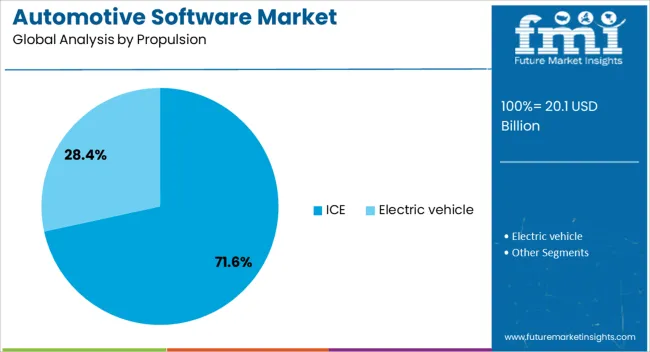
The ICE segment, representing 71.60% of the propulsion category, currently leads due to the large installed base of internal combustion engine vehicles worldwide and the continued demand in markets with slower electric vehicle adoption. Software applications in ICE vehicles are focused on optimizing fuel efficiency, meeting stringent emissions regulations, and enhancing overall engine performance.
Advanced engine control units (ECUs) rely heavily on sophisticated software algorithms to manage combustion, exhaust after-treatment, and diagnostics, ensuring compliance with environmental standards. Despite the global shift toward electrification, the ICE segment remains vital in regions with underdeveloped EV infrastructure, making software enhancements crucial for extending the lifecycle and efficiency of conventional powertrains.
Continuous updates to meet evolving regulations and the integration of connectivity features are expected to maintain the relevance of software in ICE vehicles, ensuring that this segment retains substantial market presence over the coming years.
The automotive software market is expanding as OEMs and Tier-1 suppliers prioritize vehicle connectivity, safety, and autonomous capabilities. Demand is driven by advanced driver-assistance systems (ADAS), infotainment platforms, electric vehicle (EV) management, and over-the-air updates. Challenges include software complexity, cybersecurity concerns, integration across multiple vehicle architectures, and compliance with global automotive standards. Opportunities exist in AI-enabled systems, cloud-connected services, and vehicle-to-everything (V2X) communication platforms. Trends highlight real-time data analytics, predictive maintenance, and scalable software frameworks.
Automakers are increasingly adopting automotive software solutions to enhance safety, efficiency, and user experience. ADAS, telematics, infotainment, and EV powertrain management are driving integration of sophisticated software platforms. Growing consumer demand for connected, autonomous, and energy-efficient vehicles accelerates adoption of real-time monitoring, predictive analytics, and digital services. Key priorities include seamless integration with hardware, cybersecurity, regulatory compliance, and over-the-air update capabilities. Expansion in electric and hybrid vehicle segments further fuels software demand. Automotive software solutions are becoming indispensable for enabling advanced functionalities, improving vehicle performance, and meeting evolving regulatory and consumer expectations, positioning software providers as critical partners in modern automotive development.
Cybersecurity threats, regulatory compliance across regions, and standardization challenges for communication protocols add complexity. Integration across multiple vehicle platforms, ensuring software-hardware compatibility, and managing real-time system performance are significant technical hurdles. Supply chain dependency on semiconductor and ECU manufacturers may impact deployment timelines. Buyers increasingly seek suppliers offering certified software, robust cybersecurity, modular architectures, and technical support to ensure secure, reliable, and scalable vehicle software solutions that comply with global automotive standards and provide seamless user experiences.
Opportunities exist in AI-driven vehicle control, predictive maintenance, cloud-based analytics, and vehicle-to-everything (V2X) communication systems. Connected vehicle services, fleet management software, and autonomous driving applications are expanding rapidly, especially in North America, Europe, and Asia-Pacific. Integration of AI and machine learning improves safety, efficiency, and predictive capabilities. Suppliers providing scalable, customizable, and secure software platforms with continuous support and updates are well positioned to capture growth across passenger cars, commercial vehicles, and electric vehicle segments. Strategic partnerships with OEMs, Tier-1 suppliers, and telematics providers enhance adoption and accelerate innovation in automotive software ecosystems.
The market is trending toward modular, scalable software architectures, real-time data processing, and over-the-air (OTA) update capabilities. AI and machine learning enable predictive analytics for vehicle maintenance, driver assistance, and energy optimization. Cloud connectivity supports fleet monitoring, vehicle diagnostics, and personalized user experiences. Cybersecurity measures are increasingly integrated to protect vehicle networks and data privacy. Automotive software is also evolving to support autonomous driving, electrification, and connected services. Suppliers delivering flexible, secure, and application-ready software platforms with ongoing technical support are best positioned to meet the growing demands of OEMs and mobility service providers worldwide.
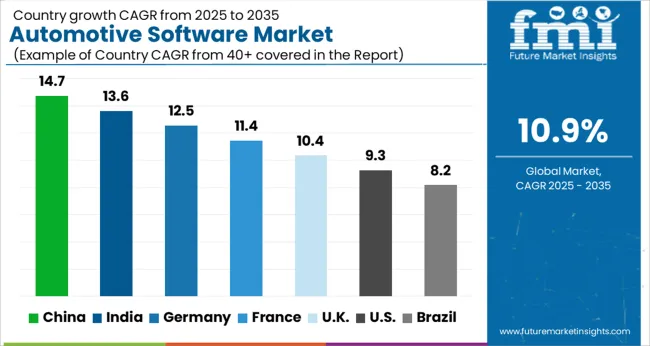
| Country | CAGR |
|---|---|
| China | 14.7% |
| India | 13.6% |
| Germany | 12.5% |
| France | 11.4% |
| UK | 10.4% |
| USA | 9.3% |
| Brazil | 8.2% |
The global automotive software market is projected to grow at a CAGR of 10.9% from 2025 to 2035. China leads at 14.7%, followed by India at 13.6%, Germany at 12.5%, the UK at 10.4%, and the USA at 9.3%. Growth is fueled by EV adoption, connected vehicle solutions, ADAS, telematics, and cybersecurity requirements. Emerging markets such as China and India benefit from government incentives, fleet management demand, and urban mobility initiatives, while mature markets focus on high-performance software, safety compliance, and autonomous driving integration. Strategic collaborations with global technology providers further accelerate innovation, deployment, and market adoption worldwide. The analysis spans over 40+ countries, with the leading markets shown below.
The automotive software market in China is projected to grow at a CAGR of 14.7% from 2025 to 2035, driven by rapid adoption of electric vehicles, connected car technologies, and advanced driver-assistance systems (ADAS). Domestic OEMs are increasingly integrating telematics, infotainment, and vehicle control software into new models. Industrial hubs in Shanghai, Guangdong, and Jiangsu facilitate software development, testing, and deployment. Partnerships with global software providers accelerate innovation in autonomous driving algorithms, cybersecurity, and over-the-air (OTA) update systems. Government incentives supporting EV adoption and smart mobility infrastructure further stimulate demand. Consumer preference for smart, connected, and safe vehicles continues to propel software integration.
The automotive software market in India is expected to expand at a CAGR of 13.6% from 2025 to 2035, fueled by rising EV adoption, connected vehicle technologies, and telematics solutions. Domestic OEMs are integrating driver-assistance, infotainment, and vehicle control software into passenger and commercial vehicles. Industrial clusters in Pune, Bengaluru, and Chennai provide software development and testing facilities. Collaborations with international automotive software companies are enhancing autonomous driving, navigation, and cybersecurity capabilities. Growing government support for EVs and smart transport infrastructure accelerates adoption. The demand for intelligent, connected vehicles and fleet management solutions contributes to market growth, particularly in urban centers and for commercial logistics applications.
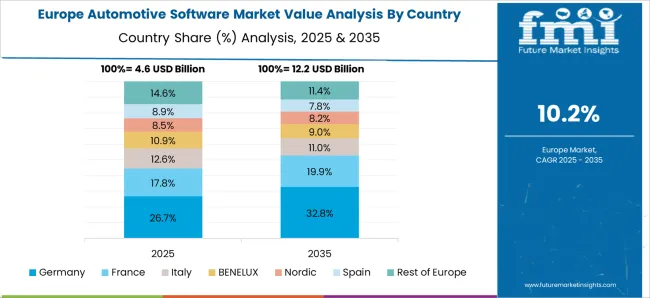
The automotive software market in Germany is projected to grow at a CAGR of 12.5% from 2025 to 2035, driven by the strong presence of automotive OEMs and suppliers. The country is a hub for ADAS, autonomous driving, and infotainment software development. German manufacturers focus on high-performance vehicle control systems, OTA updates, and cybersecurity solutions. Collaborations between traditional OEMs and tech startups are fostering innovation in AI-based driver-assistance systems and connected mobility. Regulatory standards emphasizing vehicle safety, emissions, and software quality create a conducive environment for advanced automotive software adoption. Germany’s robust automotive supply chain and R&D capabilities support rapid deployment of innovative software solutions across passenger and commercial vehicles.
The UK automotive software market is expected to grow at a CAGR of 10.4% from 2025 to 2035, supported by the adoption of connected car solutions, EV software systems, and telematics. Domestic manufacturers and technology firms are developing software for fleet management, autonomous driving, and in-vehicle infotainment. Industrial hubs in Coventry, Birmingham, and Milton Keynes provide testing and deployment facilities. Partnerships with international software providers accelerate adoption of advanced driver-assistance, cybersecurity, and OTA update solutions. Government policies promoting EVs, low-emission zones, and smart mobility enhance market potential. Consumer preference for connected and intelligent vehicles is driving software integration across passenger and commercial vehicles.
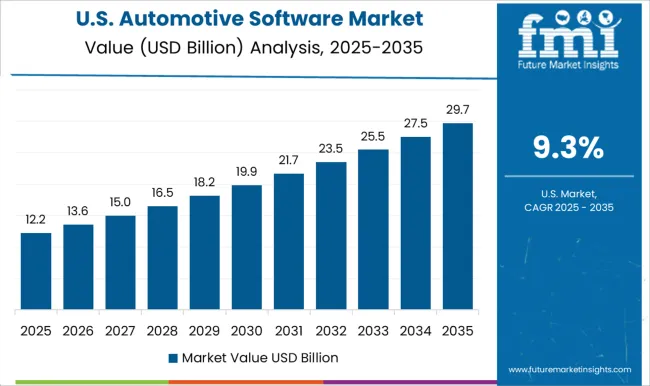
The USA automotive software market is projected to grow at a CAGR of 9.3% from 2025 to 2035, driven by EV penetration, autonomous driving technologies, and connected car solutions. Manufacturers are investing in ADAS, telematics, cybersecurity, and OTA software updates to meet consumer demand and regulatory requirements. Key automotive hubs in Michigan, California, and Texas support software development, integration, and testing. Partnerships with technology providers enhance capabilities in vehicle control, fleet management, and infotainment systems. Consumer demand for safety, connectivity, and smart features accelerates adoption across passenger and commercial vehicles. Corporate fleets and logistics operators are increasingly leveraging software for efficiency and monitoring.
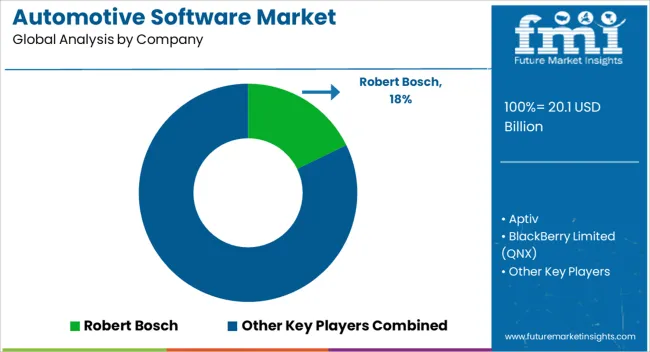
The automotive software market is driven by the proliferation of connected vehicles, autonomous driving, electrification, and advanced driver-assistance systems (ADAS). Software platforms for vehicle control, infotainment, telematics, cybersecurity, and over-the-air updates are increasingly adopted to enhance safety, efficiency, and user experience. Growing regulatory pressure, consumer demand for smart mobility, and integration of AI and machine learning accelerate market expansion. Competition is shaped by real-time performance, safety compliance, and integration capabilities. Robert Bosch leads with embedded software for engine management, ADAS, and connected mobility, emphasizing robustness and ISO 26262 compliance.
Aptiv and Harman International compete in infotainment, connectivity, and vehicle-to-everything (V2X) communication, offering scalable software platforms for OEMs. BlackBerry Limited (QNX) differentiates through safety-certified operating systems and secure automotive-grade software. Continental, Denso Corporation, and Magna International focus on ADAS, sensor fusion, and ECU integration for autonomous driving. NVIDIA and NXP Semiconductors advance AI-driven computing platforms, ECU solutions, and secure communications. Siemens delivers model-based software for design, simulation, and vehicle lifecycle management. Strategies emphasize modular architectures, cybersecurity, and scalability for diverse vehicle platforms.
| Item | Value |
|---|---|
| Quantitative Units | USD 20.1 Billion |
| Offering | Application software, Operating system, and Middleware |
| Vehicle | Passenger cars, Hatchback, Sedan, SUV, Commercial vehicles, Light Commercial Vehicles (LCV), and Heavy Commercial Vehicles (HCV) |
| Propulsion | ICE and Electric vehicle |
| Application | Safety systems, Infotainment & telematics, Powertrain & chassis, Body control & comfort, and Others |
| End Use | OEM and Aftermarket |
| Regions Covered | North America, Europe, Asia-Pacific, Latin America, Middle East & Africa |
| Country Covered | United States, Canada, Germany, France, United Kingdom, China, Japan, India, Brazil, South Africa |
| Key Companies Profiled | Robert Bosch, Aptiv, BlackBerry Limited (QNX), Continental, Denso Corporation, Harman International, Magna International, NVIDIA, NXP Semiconductors, and Siemens |
| Additional Attributes | Dollar sales by software type (ADAS, infotainment, telematics, powertrain, cybersecurity), deployment mode (embedded, cloud-based), and application (passenger vehicles, commercial vehicles, electric vehicles, autonomous vehicles). Demand is driven by autonomous driving adoption, connected vehicle technologies, and electrification trends. Regional trends highlight strong growth in North America and Europe due to advanced automotive R&D, while Asia-Pacific shows rapid expansion with EV adoption and smart mobility initiatives in China, Japan, and South Korea. |
The global automotive software market is estimated to be valued at USD 20.1 billion in 2025.
The market size for the automotive software market is projected to reach USD 56.5 billion by 2035.
The automotive software market is expected to grow at a 10.9% CAGR between 2025 and 2035.
The key product types in automotive software market are application software, operating system and middleware.
In terms of vehicle, passenger cars segment to command 62.7% share in the automotive software market in 2025.






Our Research Products

The "Full Research Suite" delivers actionable market intel, deep dives on markets or technologies, so clients act faster, cut risk, and unlock growth.

The Leaderboard benchmarks and ranks top vendors, classifying them as Established Leaders, Leading Challengers, or Disruptors & Challengers.

Locates where complements amplify value and substitutes erode it, forecasting net impact by horizon

We deliver granular, decision-grade intel: market sizing, 5-year forecasts, pricing, adoption, usage, revenue, and operational KPIs—plus competitor tracking, regulation, and value chains—across 60 countries broadly.

Spot the shifts before they hit your P&L. We track inflection points, adoption curves, pricing moves, and ecosystem plays to show where demand is heading, why it is changing, and what to do next across high-growth markets and disruptive tech

Real-time reads of user behavior. We track shifting priorities, perceptions of today’s and next-gen services, and provider experience, then pace how fast tech moves from trial to adoption, blending buyer, consumer, and channel inputs with social signals (#WhySwitch, #UX).

Partner with our analyst team to build a custom report designed around your business priorities. From analysing market trends to assessing competitors or crafting bespoke datasets, we tailor insights to your needs.
Supplier Intelligence
Discovery & Profiling
Capacity & Footprint
Performance & Risk
Compliance & Governance
Commercial Readiness
Who Supplies Whom
Scorecards & Shortlists
Playbooks & Docs
Category Intelligence
Definition & Scope
Demand & Use Cases
Cost Drivers
Market Structure
Supply Chain Map
Trade & Policy
Operating Norms
Deliverables
Buyer Intelligence
Account Basics
Spend & Scope
Procurement Model
Vendor Requirements
Terms & Policies
Entry Strategy
Pain Points & Triggers
Outputs
Pricing Analysis
Benchmarks
Trends
Should-Cost
Indexation
Landed Cost
Commercial Terms
Deliverables
Brand Analysis
Positioning & Value Prop
Share & Presence
Customer Evidence
Go-to-Market
Digital & Reputation
Compliance & Trust
KPIs & Gaps
Outputs
Full Research Suite comprises of:
Market outlook & trends analysis
Interviews & case studies
Strategic recommendations
Vendor profiles & capabilities analysis
5-year forecasts
8 regions and 60+ country-level data splits
Market segment data splits
12 months of continuous data updates
DELIVERED AS:
PDF EXCEL ONLINE
Automotive Logistics Management Software Market Size and Share Forecast Outlook 2025 to 2035
Automotive Direct Liquid Cooling IGBT Module Market Size and Share Forecast Outlook 2025 to 2035
Automotive Hoses and Assemblies Market Size and Share Forecast Outlook 2025 to 2035
Automotive Network Testing Market Size and Share Forecast Outlook 2025 to 2035
Automotive Performance Part Market Size and Share Forecast Outlook 2025 to 2035
Software-Defined Wide Area Network Market Size and Share Forecast Outlook 2025 to 2035
Automotive Carbon Ceramic Brake Market Size and Share Forecast Outlook 2025 to 2035
Automotive Camshaft Market Size and Share Forecast Outlook 2025 to 2035
Automotive Stamping Industry Analysis in India Size and Share Forecast Outlook 2025 to 2035
Automotive Cylinder Liner Market Size and Share Forecast Outlook 2025 to 2035
Automotive Microcontroller Market Size and Share Forecast Outlook 2025 to 2035
Automotive Roof Rails Market Size and Share Forecast Outlook 2025 to 2035
Automotive Active Safety System Market Size and Share Forecast Outlook 2025 to 2035
Automotive Diagnostic Scan Tool Market Size and Share Forecast Outlook 2025 to 2035
Automotive Test Equipment Market Size and Share Forecast Outlook 2025 to 2035
Automotive Dynamic Map Data Market Size and Share Forecast Outlook 2025 to 2035
Automotive Green Tires Market Size and Share Forecast Outlook 2025 to 2035
Automotive E-Tailing Market Size and Share Forecast Outlook 2025 to 2035
Automotive Interior Market Forecast Outlook 2025 to 2035
Automotive Key Market Size and Share Forecast Outlook 2025 to 2035

Thank you!
You will receive an email from our Business Development Manager. Please be sure to check your SPAM/JUNK folder too.
Chat With
MaRIA